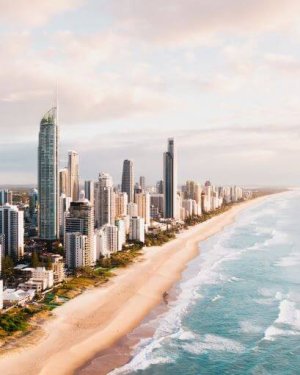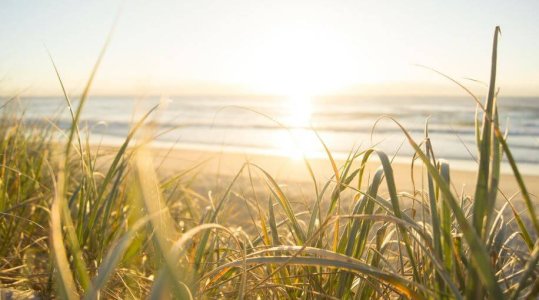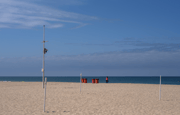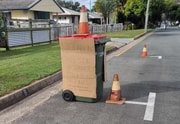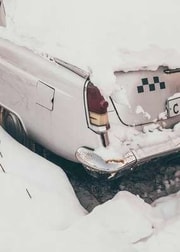American expat stunned after identifying mysterious beach noise in Australia
- Replies 6
Moving to a new country can be an incredibly exciting adventure. Immersing yourself in the culture, meeting new people, and discovering local flora and fauna offers not only an enriching experience, but also provides a unique perspective on how other people live.
Just recently, an American expat visiting the Gold Coast was taken aback when she heard a strange noise while walking along the beach.
Tate Duane has been trying to adjust to her new life Down Under after moving from California to Melbourne. However, during one of her recent journeys, she visited a beach on the Gold Coast, where she soon discovered a 'squeaky' noise rising up from below her feet as she walked on the sand.
Ms Duane then took to TikTok to share her bizarre discovery.
In her clip, Ms Duane can be seen walking on the beach, with a faint squeaky sound following after each step on the sand. ‘This is literally insane, I’ve never heard squeaky sand before,’ she claimed.
Then she asked in her video: ‘How and why does the sand squeak on the Gold Coast?’
Locals quickly weighed in on the situation and flocked to the comments under Ms Duane’s video.
‘Good sand squeaks,’ one stated.
One said that this happens a lot on Australian beaches.
Someone asked if this was ‘not a thing’ in any other country aside from Australia, to which one replied that this happens in New Zealand too. ‘I absolutely hate the noise,’ the commenter shared.
One more replied: ‘Oh no, I actually hate the sound and the feel of the soft squeaky sand but I’m fine once I get to the wet sand.’
According to one of the commenters, there’s a beach at Wilson’s prom called ‘squeaky beach’ because of its peculiar sand.
‘You have to take a trip down to Wilson’s prom when you’re back in Melbourne. Squeaky beach is one of the many stunning spots there,’ one added.
Some speculated why the sand made squeaky sounds.
‘It usually happens more when it’s hot,’ someone offered.
Another replied: ‘It just means it’s all sand and nothing else, what beaches are you comparing to that don’t?’
‘It’s high silicone content in the sand,’ added another.
According to Parks Victoria, the fine, rounded grains of quartz sand compress under your feet, which then creates a high-pitched squeak.
You can watch Ms Duane’s video below:
Science ABC provided their own explanation for the squeaky sand or ‘singing beaches’ as they are known in some places. They said that these kinds of beaches can be found in many places across the globe and on every continent (except Antarctica). They also claimed that certain conditions must be met first.
Research suggests that singing sand appears to be ‘whiter’ and more lustrous as compared to its ‘silent’ counterparts, and supported the statement made by Parks Victoria that singing sand is composed almost entirely of white quartz grains.
Quartz is crystalline silicon dioxide, which is commonly used for the manufacturing of glass. On the other hand, sand on normal beaches consists of a wide variety of rock grains, shell particles, and organic matter.
Another condition that must be met is that sand grains must be uniform in size, well-sorted, well-rounded, and polished. It should also be dry and free of impurities.
The sound is then generated because of the friction between uniformly sized sand particles. So, when you walk over the singing sand, the particles on the surface get displaced and rub against the surrounding sand layer. It is believed that the sand grains ‘glide over’ each other in unison and the frictional energy due to this makes the sand vibrate.
The vibrating grains transfer their energy to the air pockets between them and subsequently makes the air vibrate around them. When this sound reaches our ears, it can be heard as a whistle, a squeak or a yelp.
You can watch a great example of singing sand below:
 Have you also noticed the squeaky sand at the beach, members? Do you love it or hate it? Let us know your thoughts in the comments!
Have you also noticed the squeaky sand at the beach, members? Do you love it or hate it? Let us know your thoughts in the comments!
Just recently, an American expat visiting the Gold Coast was taken aback when she heard a strange noise while walking along the beach.
Tate Duane has been trying to adjust to her new life Down Under after moving from California to Melbourne. However, during one of her recent journeys, she visited a beach on the Gold Coast, where she soon discovered a 'squeaky' noise rising up from below her feet as she walked on the sand.
Ms Duane then took to TikTok to share her bizarre discovery.
In her clip, Ms Duane can be seen walking on the beach, with a faint squeaky sound following after each step on the sand. ‘This is literally insane, I’ve never heard squeaky sand before,’ she claimed.
Then she asked in her video: ‘How and why does the sand squeak on the Gold Coast?’
Locals quickly weighed in on the situation and flocked to the comments under Ms Duane’s video.
‘Good sand squeaks,’ one stated.
One said that this happens a lot on Australian beaches.
Someone asked if this was ‘not a thing’ in any other country aside from Australia, to which one replied that this happens in New Zealand too. ‘I absolutely hate the noise,’ the commenter shared.
One more replied: ‘Oh no, I actually hate the sound and the feel of the soft squeaky sand but I’m fine once I get to the wet sand.’
According to one of the commenters, there’s a beach at Wilson’s prom called ‘squeaky beach’ because of its peculiar sand.
‘You have to take a trip down to Wilson’s prom when you’re back in Melbourne. Squeaky beach is one of the many stunning spots there,’ one added.
Some speculated why the sand made squeaky sounds.
‘It usually happens more when it’s hot,’ someone offered.
Another replied: ‘It just means it’s all sand and nothing else, what beaches are you comparing to that don’t?’
‘It’s high silicone content in the sand,’ added another.
According to Parks Victoria, the fine, rounded grains of quartz sand compress under your feet, which then creates a high-pitched squeak.
You can watch Ms Duane’s video below:
Science ABC provided their own explanation for the squeaky sand or ‘singing beaches’ as they are known in some places. They said that these kinds of beaches can be found in many places across the globe and on every continent (except Antarctica). They also claimed that certain conditions must be met first.
Research suggests that singing sand appears to be ‘whiter’ and more lustrous as compared to its ‘silent’ counterparts, and supported the statement made by Parks Victoria that singing sand is composed almost entirely of white quartz grains.
Quartz is crystalline silicon dioxide, which is commonly used for the manufacturing of glass. On the other hand, sand on normal beaches consists of a wide variety of rock grains, shell particles, and organic matter.
Another condition that must be met is that sand grains must be uniform in size, well-sorted, well-rounded, and polished. It should also be dry and free of impurities.
The sound is then generated because of the friction between uniformly sized sand particles. So, when you walk over the singing sand, the particles on the surface get displaced and rub against the surrounding sand layer. It is believed that the sand grains ‘glide over’ each other in unison and the frictional energy due to this makes the sand vibrate.
The vibrating grains transfer their energy to the air pockets between them and subsequently makes the air vibrate around them. When this sound reaches our ears, it can be heard as a whistle, a squeak or a yelp.
You can watch a great example of singing sand below:
Key Takeaways
- American expat Tate Duane was confused over the unusual noise coming from the sand when she visited an Australian beach.
- The high-pitched squeak is due to the compression of fine, rounded grains of sand causing the particles to rub together when stepped upon.
- The squeaky sound of the sand has become so famous in one beach it was given the name ‘squeaky beach’.
- Tate’s video showed that this phenomenon is common not just in Australia but also in other countries such as New Zealand.

